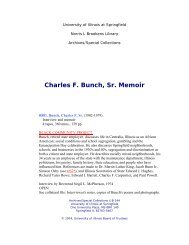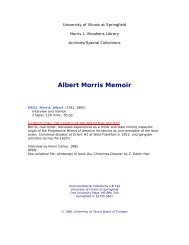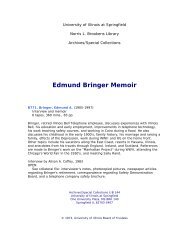Gerald W. Smith Memoir - Brookens Library
Gerald W. Smith Memoir - Brookens Library
Gerald W. Smith Memoir - Brookens Library
You also want an ePaper? Increase the reach of your titles
YUMPU automatically turns print PDFs into web optimized ePapers that Google loves.
<strong>Gerald</strong> W. <strong>Smith</strong> 214Q. Would these have really constituted penalties, or is this prettymuch local pride--not wanting to be treated differently from the newcomers?A. Well; 1 think you have to take into account what your definition of apenalty is. I would have felt that had I been the board of education ofa school district, or had I been the b od of trustees of one of theseexisting dfstricts, had I been the dean or president of such an institutionand operating a corramulity college program which I considered cornparable to those of the other districts of the State, but was not eligiblefor the same benefits, I believe I would have envisioned it as a penalty.Q. It is very understandable.A. I think that the language in the Master Plan meant that these peoplewere gofng to be allowed to continue their work, without taking anythingaway fYom them. Which was true. They weren't going to give them anyless in apportionment than they were getting. At the time they weren'teligible for any capital funding and I think that the term "without penalty,"if envisioned as meaning they won't take anything away from you, then youcan accept that, but if you saw yourself as perhaps being a pioneer in thedevelopment of colleges and then all of a sudden they were going to startanother one alongside you and give them advantages not available to you,you would feel that was a penalty.Another issue that developed during the period of tW that I am speakingabout was related to tuition. The Master Plan had recommended that thenew Illinois cornrmnity colleges established under the proposed new atatesystem should operate tuition free. The language says lttuition not becharged to any Illinois resident;" and that became an issue. And it becamean issue, for example, from several areas. Within the comitycollege system itself there was a difference of opinion. Some of thejunior colleges in Illinois charged tuition; back in the 1950's the deanshad struggled to get legislation that authorized the collection of tuition.Those distdcts that were charging tuition were in favor of continulthe tuition. There were districts in Illinois that did not charge tu "f tionand never had. Chicago had been operating since 1911 withoutThe Southern Illinois junior college district generallytuition. Those junior colleges were opposed to aso that there was a difference wfthin the area.leaders in higher education, there was a difference of opinion.END OF SIDE TWO TAPE ELEVENQ. Please go ahead Gerry with your discourse.A. There were those people among the institutions of higher educationand in the higher education cornunity who were of the opinion that if thecodty colleges were being made a part of the state system of highereducation, then tuition there was just as appropriate as it was in the seniorinstitution. They noted that it had always been a policy In Illinois to





